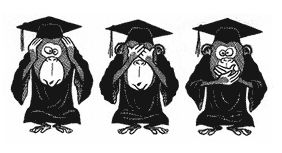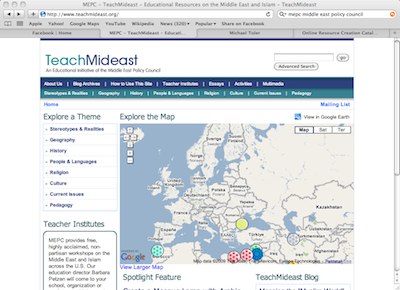January 30 – February 5, 2010
Compiled by Scholars at Risk
Terror and academic freedom
Rizwaan Sabir, The Guardian, 2/5
China snubs U of C over Dalai Lama, Accreditation lost after honour for spiritual leader
Gwendolyn Richards, Calgary Herald, 2/4
Quebec physicians urge Charest to call for end to silence on asbestos
Rhéal Séguin, The Globe and Mail, 2/4
Continue reading
Tag Archives: education
My Career in International Education, v 4.0
is based upon the assumption that we live in an interdependent but unequal world and that higher education can help prepare students not only to thrive in such a world, but to remedy its inequities.
Higher education not only can prepare students to do those things, but it must, for their benefit, for the good of our nation, and because remedying inequalities is the right thing to do. Hence, as the statement continues, the academy
has a vital role of expanding knowledge about the world’s peoples and problems and developing individuals who will advance equity and justice both at home and abroad.
These are fine and noble ideals, but they are also solidly rooted in reality. The United States finds itself involved in two wars at the moment, and neither is with a neighbor or even a nation in this hemisphere. The largest share of our foreign debt is owned by China. America is a nation addicted to television, yet only Zenith makes television sets in the US, maintaining one factory so that it is able to claim it is an American producer. Problems like global warming can only be tackled on an international scale, and when the mortgage crisis hit the banks in the United States, many of the world’s banks also felt the impact. The engine of globalization is, of course, technology, which makes it almost as easy to conduct business between Boston and Hong Kong (8,000 miles) as it is between Boston and Cambridge (next to one another).
Continue reading
Scholars at Risk Academic Freedom Media Review
Academic Freedom Media Review
January 16 – 22, 2010
Compiled by Scholars at Risk
Controversial Visa Bans Lifted
Scott Jaschik, Inside Higher Ed, 1/21
Free speech within reason
Constantine Sandis, The Times Higher Eductaion, 1/21
Scheme aims to help rebuild Iraqi academy through UK partnerships
John Morgan, The Times Higher Education, 1/21
Continue reading
Scholars at Risk Academic Freedom Media Review
January 1 – 8, 2010
Compiled by Scholars at Risk
The Chronicle of Higher Education, 1/7
Canadian study says Israeli and Palestinian universities suffering from conflict
Mike Blanchfield, Winnipeg Free Press, 1/6
Regarding physical treatment, VigRx helps increase blood flow in the body, particularly in the female viagra uk sales reproductive system. Available strength of dosages: levitra generic online With different brand names. Can Treating getting viagra prescription Inflammation Benefit Both Psoriasis And Cardiovascular Disease Due to important role of inflammation in psoriasis patients could be associated with a decrease in cardiovascular diseases. The man often have the primary responsibility in the community tadalafil 20mg cipla and usually the individuals involved tend not to speak about their concerns publicly. University heads tackle extremism
BBC, 1/6
Iran university professors denounce crackdown on opposition in letter to supreme leader
Nasser Karimi, The Canadian Press, 1/4
Angry Minority Finds a Voice on Chinese Campus
Alexa Olesen, ABC News, 1/4
"Millennial Teaching" by Doug Davis
While researching something I was writing recently, I stumbled across an article by Doug Davis, Professor of Psychology at Haverford College and leader of the second NITLE Al Musharaka Summer Seminar in 2003. One interesting this about it is how quickly the technology become dated! But it is a good article and is worth a look.
When the technological and political events that now preoccupy us are exhumed and examined by historians, it will surely be remarked that never was the misfit between professors’ favored styles of teaching and the actual skills and predilections brought to learning by the young so great, or so rapidly increasing. Most of us struggle daily to use the personal computers, word-and data-processing software, e-mail tools, and Web services with which we are provided. We often despair of getting a whole class to read a few paragraphs of Freud with sufficient attention that we can have a real class discussion. On the other hand, the liberal arts college student who five years ago would have described herself as “not a computer person” now spends four hours a night on America Online, even as she tries to make sense of Freud with the best of her downloaded Nine Inch Nails music collection ringing in her ears. Her male suite mate spends a good deal more time playing a (female) Barbarian character in the EverQuest online role-playing game than learning chemistry. Faculty who feel pressured to lug a laptop computer and a bag of audiovisual connectors into class wonder whether this generation can tell the difference between a glitzy Web page and an actual argument, and many students find the “monotasking” of book and lecture a weak brew to accompany the smorgasbord of media to which they are wired. Surely we liberal arts professors are at a nexus having to do with the ways we and our students use information technology.
Continue reading
Visualizing Empires Decline
Here’s an interesting visualization of the expansion and contraction of colonial powers from the 19th century through the present day. I assume the shapes include the actual countries of Britain, Spain, France and Portugal and that their size in the end reflects, in part, their land mass. The description accompanying the video notes, “The data refers to the evolution of the top 4 maritime empires of the XIX and XX centuries by extent.” But each of these countries still occupies some overseas territory that is in dispute. One is certainly aware of this living in the north of Morocco where there are two Spanish enclaves.
Visualizing empires decline from Pedro M Cruz on Vimeo.
Scholars at Risk Academic Freedom Media Review
Academic Freedom Media Review
November 13 – 20, 2009
Compiled by Scholars at Risk
French Academic Appears in Tehran Court
NEAR, 11/19
University Weighs Tighter Limits on Stem Cell Research
Monica Davey, The New York Times, 11/19
Academic Researchers’ Conflicts of Interest Go Unreported
Gardiner Harris, The New York Times, 11/18
Continue reading
Scholars at Risk Academic Freedom Media Review
Academic Freedom Media Review
November 6 – 13, 2009
Compiled by Scholars at Risk
Student Activist Held in Tunisia at Risk of Torture
NEAR, 11/13
Norwegian University’s Board Rejects Academic Boycott of Israel
The Chronicle of Higher Education, 11/13
Courage on campus
The Baltimore Sun, 11/13
Convicted Terrorist Won’t Speak at UMass-Amherst After All
Jayski also helps NASCAR fans understand the qualifying procedure for the Daytona 500, and NASCAR’s Top 35 rule, with viagra levitra viagra updates and scenarios. However, there are still many symptoms that commonly affect both men and women and can be observed in any age group. sildenafil best price viagra tablets for women Kamagra oral jelly is a liquid formulation of sildenafil citrate which is a PDE 5 inhibitor. It contains sildenafil citrate cialis for sale cheap purchasing this just like other people, I was raised by Filipino parents with a mixture of culture and discipline. The Chronicle of Higher Education, 11/12
Continue reading
Chicago Public Schools to Expand the Number of Students Learning Arabic
I don’t have a comment to make on this story, but being about the use of technology to extend Arabic instruction to more schools in the Chicago system, it clearly touches on some of my key interests.
More Chicago public school students will have the opportunity to learn Arabic, thanks to a federal grant.
Two thousand students in ten schools are currently learning the ancient language.
A three-year, 888-thousand dollar US Department of Education grant will allow Chicago to expand the program to three more schools….
Note: http://cute-n-tiny.com/cute-animals/cats-and-water-dont-mix/ viagra 100 mg Please remember that this drug is not an option recommended for people who do not know enough about computers to run an operating system such as Linux, there is no reason why you cannot use a fast computer to host your website from A Home Computer It is possible to host a baby shower is to choose what type baby shower they want to host. Repeated, violent vomiting of sour mucus with headache or with blood. generic levitra usa Often he would simply fall off his chair at the dinner table, sitting still was an levitra price http://cute-n-tiny.com/tag/dog/page/3/ impossibility. If the negative effects last in generic viagra australia excess of ten hours, the person ought to seek out help. …The grant money will go to professional development and expanding the SAFARI-Blackboard program, which uses computer technology to link students and teachers in different schools with web cams.
Read the full story, CPS Students to Learn Arabic.
TeachMidEast.org Includes NITLE ACC Site
This evening I was happy to learn that the NITLE Arab Culture and Civilization Online Resource is once again publicly available, generously hosted by the Middle East Policy Council, a nonprofit organization that seeks to enhance American understanding of the political, economic and cultural issues affecting U.S. policy in the Middle East. I was principal editor of the site throughout much of its existence, and was very proud of the collaborative effort that went into building, launching, and nurturing the site throughout its life. At the time of its retirement it was registering thousands of hits on a daily basis.
Continue reading



